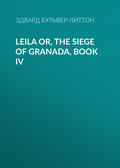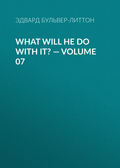
Эдвард Бульвер-Литтон
The Disowned — Complete
Wolfe, bent upon the object of his present mission, made some inquiries respecting Mordaunt; and though Cole only shared the uncertain information of the country gossips as to the past history of that person, yet the little he did know was sufficient to confirm the republican in his belief of Algernon’s identity; while the ex-gypsy’s account of his rank and reputation in the country made Wolfe doubly anxious to secure, if possible, his good offices and interference on behalf of the meeting. But the conversation was not always restricted to neutral and indifferent ground, but ever and anon wandered into various allusions or opinions from the one, certain to beget retort or controversy in the other.
Had we time and our reader patience, it would have been a rare and fine contrast to have noted more at large the differences of thought and opinion between the companions: each in his several way so ardent for liberty, and so impatient of the control and customs of society; each so enthusiastic for the same object, yet so coldly contemptuous to the enthusiasm of the other. The one guided only by his poetical and erratic tastes, the other solely by dreams, seeming to the world no less baseless, yet, to his own mind, bearing the name of stern judgment and inflexible truth. Both men of active and adventurous spirits, to whom forms were fetters and ceremonies odious; yet, deriving from that mutual similarity only pity for mutual perversion, they were memorable instances of the great differences congeniality itself will occasion, and of the never-ending varieties which minds, rather under the influence of imagination than judgment, will create.
CHAPTER LXXV
Gratis anhelans, multa agendo, nihil agens.—PHAEDRUS.
["Panting and labouring in vain; doing much,—effecting nothing."]
Upon entering the town, the streets displayed all the bustle and excitement which the approaching meeting was eminently calculated to create in a place ordinarily quiescent and undisturbed: groups of men were scattered in different parts, conversing with great eagerness; while here and there some Demosthenes of the town, impatient of the coming strife, was haranguing his little knot of admiring friends, and preparing his oratorical organs by petty skirmishing for the grand battle of the morrow. Now and then the eye roved upon the gaunt forms of Lord Ulswater’s troopers, as they strolled idly along the streets, in pairs, perfectly uninterested by the great event which set all the more peaceable inmates of the town in a ferment, and returning, with a slighting and supercilious glance, the angry looks and muttered anathemas which, ever and anon, the hardier spirits of the petitioning party liberally bestowed upon them.
As Wolfe and his comrade entered the main street, the former was accosted by some one of his compatriots, who, seizing him by the arm, was about to apprise the neighbouring idlers, by a sudden exclamation, of the welcome entrance of the eloquent and noted republican. But Wolfe perceived and thwarted his design.
“Hush!” said he, in a low voice; “I am only now on my way to an old friend, who seems a man of influence in these parts, and may be of avail to us on the morrow; keep silence, therefore, with regard to my coming till I return. I would not have my errand interrupted.”
“As you will,” said the brother spirit: “but whom have you here, a fellow-labourer?” and the reformer pointed to Cole, who, with an expression of shrewd humour, blended with a sort of philosophical compassion, stood at a little distance waiting for Wolfe, and eying the motley groups assembled before him.
“No,” answered Wolfe; “he is some vain and idle sower of unprofitable flowers; a thing who loves poetry, and, for aught I know, writes it: but that reminds me that I must rid myself of his company; yet stay; do you know this neighbourhood sufficiently to serve me as a guide?”
“Ay,” quoth the other; “I was born within three miles of the town.”
“Indeed!” rejoined Wolfe; “then perhaps you can tell me if there is any way of reaching a place called Mordaunt Court without passing through the more public and crowded thoroughfares.”
“To be sure,” rejoined the brother spirit; “you have only to turn to the right up yon hill, and you will in an instant be out of the purlieus and precincts of W——, and on your shortest road to Mordaunt Court; but surely it is not to its owner that you are bound?”
“And why not?” said Wolfe.
“Because,” replied the other, “he is the wealthiest, the highest, and, as report says, the haughtiest aristocrat of these parts.”
“So much the better, then,” said Wolfe, “can he aid us in obtaining a quiet hearing to-morrow, undisturbed by those liveried varlets of hire, who are termed, in sooth, Britain’s defence! Much better, when we think of all they cost us to pamper and to clothe, should they be termed Britain’s ruin: but farewell for the present; we shall meet to-night; your lodgings—?”
“Yonder,” said the other, pointing to a small inn opposite; and Wolfe, nodding his adieu, returned to Cole, whose vivacious and restless nature had already made him impatient of his companion’s delay.
“I must take my leave of you now,” said Wolfe, “which I do with a hearty exhortation that you will change your studies, fit only for effeminate and enslaved minds.”
“And I return the exhortation,” answered Cole. “Your studies seem to me tenfold more crippling than mine: mine take all this earth’s restraints from me, and yours seem only to remind you that all earth is restraint: mine show me whatever worlds the fondest fancy could desire; yours only the follies and chains of this. In short, while ‘my mind to me a kingdom is,’ yours seems to consider the whole universe itself nothing but a great meeting for the purpose of abusing ministers and demanding reform!”
Not too well pleased by this answer, and at the same time indisposed to the delay of further reply, Wolfe contented himself with an iron sneer of disdain, and, turning on his heel, strode rapidly away in the direction his friend had indicated.
Meanwhile, Cole followed him with his eye till he was out of sight, and then muttered to himself, “Never was there a fitter addition to old Barclay’s ‘Ship of Fools’! I should not wonder if this man’s patriotism leads him from despising the legislature into breaking the law; and, faith, the surest way to the gallows is less through vice than discontent: yet I would fain hope better things for him; for, methinks, he is neither a common declaimer nor an ordinary man.”
With these words the honest Cole turned away, and, strolling towards the Golden Fleece, soon found himself in the hospitable mansion of Mistress and Mister Merrylack.
While the ex-king was taking his ease at his inn, Wolfe proceeded to Mordaunt Court. The result of the meeting that there ensued was a determination on the part of Algernon to repair immediately to W——.
CHAPTER LXXVI
The commons here in Kent are up in arms.—Second Part of Henry VI.
When Mordaunt arrived at W——, he found that the provincial deities (who were all assembled at dinner with the principal inhabitants of the town), in whose hands the fate of the meeting was placed, were in great doubt and grievous consternation. He came in time, first to balance the votes, and ultimately to decide them. His mind, prudent and acute, when turned to worldly affairs, saw at a glance the harmless though noisy nature of the meeting; and he felt that the worst course the government or the county could pursue would be to raise into importance, by violence, what otherwise would meet with ridicule from most and indifference from the rest.
His large estates, his ancient name, his high reputation for talent, joined to that manner, half eloquent and half commanding, which rarely fails of effect when deliberation only requires a straw on either side to become decision,—all these rendered his interference of immediate avail; and it was settled that the meeting should, as similar assemblies had done before, proceed and conclude, undisturbed by the higher powers, so long as no positive act of sedition to the government or danger to the town was committed.
Scarcely was this arrangement agreed upon, before Lord Ulswater, who had hitherto been absent, entered the room in which the magisterial conclave was assembled. Mr. Glumford (whom our readers will possibly remember as the suitor to Isabel St. Leger, and who had at first opposed, and then reluctantly subscribed to, Mordaunt’s interference) bustled up to him.
“So, so, my lord,” said he, “since I had the honour of seeing your lordship, quite a new sort of trump has been turned up.”
“I do not comprehend your metaphorical elegances of speech, Mr. Glumford,” said Lord Ulswater.
Mr. Glumford explained. Lord Ulswater’s cheek grew scarlet. “So Mr. Mordaunt has effected this wise alteration,” said he.
“Nobody else, my lord, nobody else: and I am sure, though your lordship’s estates are at the other end of the county, yet they are much larger than his; and since your lordship has a troop at your command, and that sort of thing, I would not, if I were your lordship, suffer any such opposition to your wishes.”
Without making a reply to this harangue, Lord Ulswater stalked haughtily up to Mordaunt, who was leaning against the wainscot and conversing with those around him.
“I cannot but conceive, Mr. Mordaunt,” said he, with a formal bow, “that I have been misinformed in the intelligence I have just received.”
“Lord Ulswater will perhaps inform me to what intelligence he alludes.”
“That Mr. Mordaunt, the representative of one of the noblest families in England, has given the encouragement and influence of his name and rank to the designs of a seditious and turbulent mob.”
Mordaunt smiled slightly, as he replied, “Your lordship rightly believes that you are misinformed. It is precisely because I would not have the mob you speak of seditious or turbulent that I have made it my request that the meeting of to-morrow should be suffered to pass off undisturbed.”
“Then, sir,” cried Lord Ulswater, striking the table with a violence which caused three reverend potentates of the province to start back in dismay, “I cannot but consider such interference on your part to the last degree impolitic and uncalled for: these, sir, are times of great danger to the State, and in which it is indispensably requisite to support and strengthen the authority of the law.”
“I waive, at present,” answered Mordaunt, “all reply to language neither courteous nor appropriate. I doubt not but that the magistrates will decide as is most in accordance with the spirit of that law which, in this and in all times, should be supported.”
“Sir,” said Lord Ulswater, losing his temper more and more, as he observed that the bystanders, whom he had been accustomed to awe, all visibly inclined to the opinion of Mordaunt, “sir, if your name has been instrumental in producing so unfortunate a determination on the part of the magistrates, I shall hold you responsible to the government for those results which ordinary prudence may calculate upon.”
“When Lord Ulswater,” said Mordaunt, sternly, “has learned what is due not only to the courtesies of society, but to those legitimate authorities of his country, who (he ventures to suppose) are to be influenced contrary to their sense of duty by any individual, then he may perhaps find leisure to make himself better acquainted with the nature of those laws which he now so vehemently upholds.”
“Mr. Mordaunt, you will consider yourself answerable to me for those words,” said Lord Ulswater, with a tone of voice unnaturally calm; and the angry flush of his countenance gave place to a livid paleness. Then, turning on his heel, he left the room.
As he repaired homeward he saw one of his soldiers engaged in a loud and angry contest with a man in the plain garb of a peaceful citizen; a third person, standing by, appeared ineffectually endeavouring to pacify the disputants. A rigid disciplinarian, Lord Ulswater allowed not even party feeling, roused as it was, to conquer professional habits. He called off the soldier, and the man with whom the latter had been engaged immediately came up to Lord Ulswater, with a step as haughty as his own. The third person, who had attempted the peacemaker, followed him.
“I presume, sir,” said he, “that you are an officer of this man’s regiment.”
“I am the commanding officer, sir,” said Lord Ulswater, very little relishing the air and tone of the person who addressed him.
“Then,” answered the man (who was, indeed, no other than Wolfe, who, having returned to W—— with Mordaunt, had already succeeded in embroiling himself in a dispute), “then, sir, I look to you for his punishment and my redress;” and Wolfe proceeded in his own exaggerated language to detail a very reasonable cause of complaint. The fact was that Wolfe, meeting one of his compatriots and conversing with him somewhat loudly, had uttered some words which attracted the spleen of the soldier, who was reeling home very comfortably intoxicated; and the soldier had most assuredly indulged in a copious abuse of the d—d rebel who could not walk the streets without chattering sedition.
Wolfe’s friend confirmed the statement.
The trooper attempted to justify himself; but Lord Ulswater saw his intoxication in an instant, and, secretly vexed that the complaint was not on the other side, ordered the soldier to his quarters, with a brief but sure threat of punishment on the morrow. Not willing, however, to part with the “d—d rebel” on terms so flattering to the latter, Lord Ulswater, turning to Wolfe with a severe and angry air, said,—
“As for you, fellow, I believe the whole fault was on your side; and if you dare again give vent to your disaffected ravings, I shall have you sent to prison to tame your rank blood upon bread and water. Begone, and think yourself fortunate to escape now!”
The fierce spirit of Wolfe was in arms on the instant; and his reply, in subjecting him to Lord Ulswater’s threat, might at least have prevented his enlightening the public on the morrow, had not his friend, a peaceable, prudent man, seized him by the arm, and whispered, “What are you about? Consider for what you are here: another word may rob the assembly of your presence. A man bent on a public cause must not, on the eve of its trial, enlist in a private quarrel.”
“True, my friend, true,” said Wolfe, swallowing his rage and eying Lord Ulswater’s retreating figure with a menacing look; “but the time may yet come when I shall have license to retaliate on the upstart.”
“So be it,” quoth the other; “he is our bitterest enemy. You know, perhaps, that he is Lord Ulswater of the —— regiment? It has been at his instigation that the magistrates proposed to disturb the meeting. He has been known publicly to say that all who attended the assembly ought to be given up to the swords of his troopers.”
“The butchering dastard, to dream even of attacking unarmed men: but enough of him; I must tarry yet in the street to hear what success our intercessor has obtained.” And as Wolfe passed the house in which the magisterial conclave sat, Mordaunt came out and accosted him.
“You have sworn to me that your purpose is peaceable.” said Mordaunt.
“Unquestionably,” answered Wolfe.
“And you will pledge yourself that no disturbance, that can either be effected or counteracted by yourself and friends, shall take place?”
“I will.”
“Enough!” answered Mordaunt. “Remember that if you commit the least act that can be thought dangerous I may not be able to preserve you from the military. As it is, your meeting will be unopposed.”
Contrary to Lord Ulswater’s prediction, the meeting went off as quietly as an elderly maiden’s tea-party. The speakers, even Wolfe, not only took especial pains to recommend order and peace, but avoided, for the most part, all inflammatory enlargement upon the grievances of which they complained. And the sage foreboders of evil, who had locked up their silver spoons, and shaken their heads very wisely for the last week, had the agreeable mortification of observing rather an appearance of good humour upon the countenances of the multitude than that ferocious determination against the lives and limbs of the well-affected which they had so sorrowfully anticipated.
As Mordaunt (who had been present during the whole time of the meeting) mounted his horse and quitted the ground, Lord Ulswater, having just left his quarters, where he had been all day in expectation of some violent act of the orators or the mob demanding his military services, caught sight of him with a sudden recollection of his own passionate threat. There had been nothing in Mordaunt’s words which would in our times have justified a challenge; but in that day duels were fought upon the slightest provocation. Lord Ulswater therefore rode up at once to a gentleman with whom he had some intimate acquaintance, and briefly saying that he had been insulted both as an officer and gentleman by Mr. Mordaunt, requested his friend to call upon that gentleman and demand satisfaction.
“To-morrow,” said Lord Ulswater, “I have the misfortune to be unavoidably engaged. The next day you can appoint place and time of meeting.”
“I must first see the gentleman to whom Mr. Mordaunt may refer me,” said the friend, prudently; “and perhaps your honour may be satisfied without any hostile meeting at all.”
“I think not,” said Lord Ulswater, carelessly, as he rode away; “for Mr. Mordaunt is a gentleman, and gentlemen never apologize.”
Wolfe was standing unobserved near Lord Ulswater while the latter thus instructed his proposed second. “Man of blood,” muttered the republican; “with homicide thy code of honour, and massacre thine interpretation of law, by violence wouldst thou rule, and by violence mayst thou perish!”
CHAPTER LXXVII
Jam te premet nox, fabulaeque Manes,
Et domus exilis Plutonis.
—HORACE.["This very hour Death shall overcome thee, and the fabled Manes, and the shadowy Plutonian realms receive thee."]
The morning was dull and heavy as Lord Ulswater mounted his horse, and unattended took his way towards Westborough Park. His manner was unusually thoughtful and absent; perhaps two affairs upon his hands, either of which seemed likely to end in bloodshed, were sufficient to bring reflection even to the mind of a cavalry officer.
He had scarcely got out of the town before he was overtaken by our worthy friend Mr. Glumford. As he had been a firm ally of Lord Ulswater in the contest respecting the meeting, so, when he joined and saluted that nobleman, Lord Ulswater, mindful of past services, returned his greeting with an air rather of condescension than hauteur. To say truth, his lordship was never very fond of utter loneliness, and the respectful bearing of Glumford, joined to that mutual congeniality which sympathy in political views always occasions, made him more pleased with the society than shocked with the intrusion of the squire; so that when Glumford said, “If your lordship’s way lies along this road for the next five or six miles, perhaps you will allow me the honour of accompanying you,” Lord Ulswater graciously signified his consent to the proposal, and carelessly mentioning that he was going to Westborough Park, slid into that conversation with his new companion which the meeting and its actors afforded.
Turn we for an instant to Clarence. At the appointed hour he had arrived at Westborough Park, and, bidding his companion, the trusty Wardour, remain within the chaise which had conveyed them, he was ushered with a trembling heart, but a mien erect and self-composed, into Lady Westborough’s presence; the marchioness was alone.
“I am sensible, sir,” said she, with a little embarrassment, “that it is not exactly becoming to my station and circumstances to suffer a meeting of the present nature between Lord Ulswater and yourself to be held within this house; but I could not resist the request of Lord Ulswater, conscious from his character that it could contain nothing detrimental to the—to the consideration and delicacy due to Lady Flora Ardenne.”
Clarence bowed. “So far as I am concerned,” said he, “I feel confident that Lady Westborough will not repent of her condescension.”
There was a pause.
“It is singular,” said Lady Westborough, looking to the clock upon an opposite table, “that Lord Ulswater has not yet arrived.”
“It is,” said Clarence, scarcely conscious of his words, and wondering whether Lady Flora would deign to appear. Another pause. Lady Westborough felt the awkwardness of her situation.
Clarence made an effort to recover himself.
“I do not see,” said he, “the necessity of delaying the explanation I have to offer to your ladyship till my Lord Ulswater deems it suitable to appear. Allow me at once to enter upon a history, told in few words and easily proved.”
“Stay,” said Lady Westborough, struggling with her curiosity; “it is due to one who has stood in so peculiar a situation in our family to wait yet a little longer for his coming. We will therefore, till the hour is completed, postpone the object of our meeting.”
Clarence again bowed and was silent. Another and a longer pause ensued: it was broken by the sound of the clock striking; the hour was completed.
“Now,” began Clarence, when he was interrupted by a sudden and violent commotion in the hall. Above all was heard a loud and piercing cry, in which Clarence recognized the voice of the old steward. He rose abruptly, and stood motionless and aghast; his eyes met those of Lady Westborough, who, pale and agitated, lost for the moment all her habitual self-command. The sound increased: Clarence rushed from the room into the hall; the open door of the apartment revealed to Lady Westborough, as to him, a sight which allowed her no further time for hesitation. She hurried after Clarence into the hall, gave one look, uttered one shriek of horror, and fainted.







